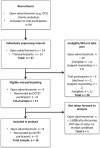Illness perceptions in people with obsessive-compulsive disorder; A qualitative study
- PMID: 30893331
- PMCID: PMC6426201
- DOI: 10.1371/journal.pone.0213495
Illness perceptions in people with obsessive-compulsive disorder; A qualitative study
Abstract
Background: Obsessive-compulsive disorder (OCD) is a serious mental health problem that causes significant impairment and reduced quality of life. Though some substantially benefit from psychological therapies, a substantial proportion of people with OCD disengage from treatment or fail to benefit. Theoretical models such as the Common-Sense Model posit that our management of physical illness depends on our perceptions about the condition. Identifying how people with OCD perceive their condition could lead to important insight that would improve treatment of OCD.
Objectives: To identify and characterise the illness perceptions of people with OCD.
Method: Transcribed semi-structured interviews exploring the illness perceptions of 16 people with OCD were analysed using thematic analysis.
Results: In some cases, identification of symptoms was hindered by a failure to interpret experiences as 'symptoms'. Instead, these individuals interpreted symptoms as a personality quirk, or as evidence that they had become deviant. Perceptions of the condition as 'part' of the self contributed to views of OCD as permanent. Individuals were concerned about the impact of OCD on friends and family and attempted to minimise its consequences, for example by concealing symptoms from their children, who they feared could acquire OCD.
Conclusion: Applying a theoretical model of physical health understanding to OCD yielded novel insights, with important implications for support and treatment. To enable early help-seeking and rapid diagnosis, public and professional knowledge about OCD should be extended beyond 'washing and checking' to the less widely known OCD-subtypes, such as fear of causing harm. It may be important to identify and challenge views of OCD as permanent early in the course of treatment to maximise engagement. Management of OCD should also address the burden of living with OCD in a family context. Further research to test whether these perceptions lead to coping responses and outcomes in OCD is now needed.
Conflict of interest statement
The authors have declared that no competing interests exist.
Similar articles
-
Separating obsessive-compulsive disorder from the self. A qualitative study of family member perceptions.BMC Psychiatry. 2017 Sep 7;17(1):326. doi: 10.1186/s12888-017-1470-4. BMC Psychiatry. 2017. PMID: 28882118 Free PMC article.
-
Seeking help for obsessive compulsive disorder (OCD): a qualitative study of the enablers and barriers conducted by a researcher with personal experience of OCD.Psychol Psychother. 2017 Jun;90(2):193-211. doi: 10.1111/papt.12090. Epub 2017 Apr 10. Psychol Psychother. 2017. PMID: 28397354
-
Obsessive--compulsive disorder: prevalence, correlates, help-seeking and quality of life in a multiracial Asian population.Soc Psychiatry Psychiatr Epidemiol. 2012 Dec;47(12):2035-43. doi: 10.1007/s00127-012-0507-8. Epub 2012 Apr 17. Soc Psychiatry Psychiatr Epidemiol. 2012. PMID: 22526825
-
Animal models of obsessive-compulsive disorder: rationale to understanding psychobiology and pharmacology.Psychiatr Clin North Am. 2006 Jun;29(2):371-90. doi: 10.1016/j.psc.2006.02.007. Psychiatr Clin North Am. 2006. PMID: 16650714 Review.
-
Obsessive-compulsive disorder.Nat Rev Dis Primers. 2019 Aug 1;5(1):52. doi: 10.1038/s41572-019-0102-3. Nat Rev Dis Primers. 2019. PMID: 31371720 Free PMC article. Review.
Cited by
-
A reduced state of being: The role of culture in illness perceptions of young adults diagnosed with depressive disorders in Singapore.PLoS One. 2021 Jun 9;16(6):e0252913. doi: 10.1371/journal.pone.0252913. eCollection 2021. PLoS One. 2021. PMID: 34106985 Free PMC article.
-
Testing the psychometric properties of the illness perceptions questionnaire for OCD (IPQ-O).BMC Psychiatry. 2019 Jul 10;19(1):217. doi: 10.1186/s12888-019-2195-3. BMC Psychiatry. 2019. PMID: 31291916 Free PMC article.
-
The Berlin Misophonia Questionnaire Revised (BMQ-R): Development and validation of a symptom-oriented diagnostical instrument for the measurement of misophonia.PLoS One. 2022 Jun 21;17(6):e0269428. doi: 10.1371/journal.pone.0269428. eCollection 2022. PLoS One. 2022. PMID: 35727794 Free PMC article.
-
Insight into the Association between Slitrk Protein and Neurodevelopmental and Neuropsychiatric Conditions.Biomolecules. 2024 Aug 26;14(9):1060. doi: 10.3390/biom14091060. Biomolecules. 2024. PMID: 39334827 Free PMC article. Review.
-
Obsessive-compulsive existential type: a dialectical-phenomenological approach.Front Psychol. 2023 Sep 5;14:1211598. doi: 10.3389/fpsyg.2023.1211598. eCollection 2023. Front Psychol. 2023. PMID: 37736151 Free PMC article.
References
-
- American Psychiatric Association. Diagnostic and Statistical Manual of Mental Disorders (DSM-5®). Fifth Edition Arlington, VA: American Psychiatric Association; 2013.
Publication types
MeSH terms
Grants and funding
LinkOut - more resources
Full Text Sources
Medical


